Corfu, a picturesque Greek island nestled in the Ionian Sea, is a very popular destination for expats. If you are considering making Corfu your overseas home, this guide is for you.
In this guide:
- Essential research for moving to Corfu: visa options, living costs, climate, and amenities.
- Travel and transport: international and local travel options and costs.
- Best places to live in Corfu: areas to consider, their pros and cons.
- Housing options: costs, housing availability, and your options.
- Healthcare and well-being: public and private healthcare options, healthcare costs and the availability of medical services.
- Lifestyle and integration: socializing and making friends, available activities, and leisure options.
Corfu highlights
Natural beauty and a good climate that enables outdoor activities and a healthier lifestyle: hiking and all kinds of water-related activities are abundant here. It is also a great place if you are into sailing and yachting, as the island has quite a few well-equipped marinas.
The weather is better than in mainland Greece. Summers are a bit cooler, so, as a rule, the island stays green and doesn’t get too scorched by heat.
English is widely spoken all over the island. You can get along without knowing Greek. However, it’s worth making an effort to learn the language.
The cost of living and housing is quite affordable but not cheap compared to other Greek destinations.
Good facilities and amenities: an international airport, local schools, hospitals, supermarkets, etc.
Sizable expat community: Corfu has the largest expat community out of all the Greek islands. Among the island’s 120,000 residents, around 6,000 come from Northern Europe, many of whom are UK nationals.
Tax incentives for foreign retirees: Foreign pensioners relocating tax residency to Greece and residing there for over six months yearly pay a 7% flat tax rate on their global income for 15 years. You can find more information in our Living In Greece guide, which has a section on taxes in Greece.
Visa and residency options
Several options are available to non-EU nationals wanting to live in Corfu permanently.
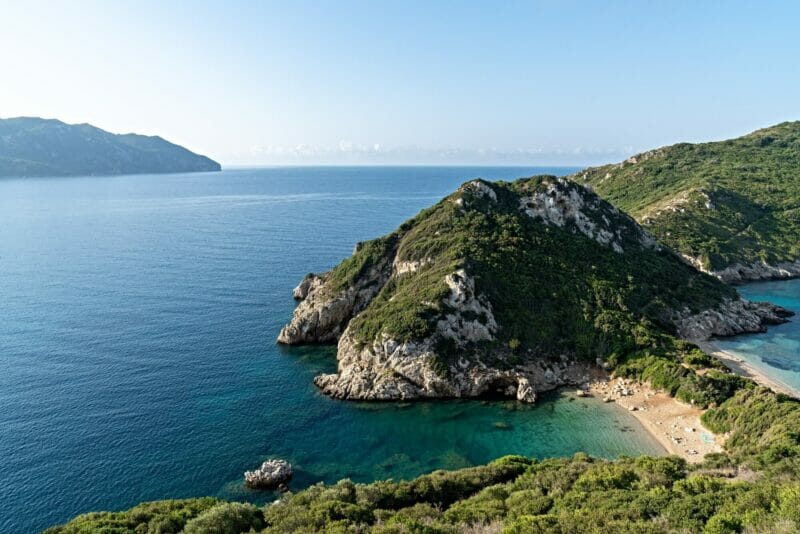
The Financially Independent Persons visa
This requires a steady annual income of €24,000, or the equivalent in savings deposited in a Greek bank, along with a health insurance plan. It is a very popular option with retirees, semi-retirees, and people with passive income.
For digital nomads, Greece’s digital nomad visa presents an enticing option, allowing a 1-year stay and requiring a monthly income of €2,000 from remote work.
For more information, visit our Greece Residency Options For Non-EU Nationals guide.
The Golden Visa program
Non-EU citizens can invest a minimum of € 250,000 in real estate in certain areas of Greece, including Corfu, and obtain a five-year residency permit, which can be renewed.
Expect to pay around 10-12% of the investment property value in various legal and government fees and taxes. Citizenship is possible if certain conditions are met.
The cost of living
The island’s cost of living is approximately 30% lower than many Western European cities.
A monthly budget starting from €1,800 is generally sufficient for a couple to live comfortably. This includes housing, groceries, transportation, and entertainment.
However, if you want to indulge in a few more luxuries, consider a monthly budget of around €2,000 to €2,500.
Do note that these figures can vary depending on your personal lifestyle and spending habits
Accommodation costs, for instance, hover around €800 per month for a two-bedroom rental apartment, varying with location and amenities.
Accommodation
If you are considering a two-bedroom rental apartment, monthly costs typically range from €700 to €1000 depending on location, amenities, and proximity to essential services.

It is possible to find a 1-bed apartment for €300 and a luxury villa for around €2,800.
Utilities
Basic utilities, including electricity, heating, cooling, water, and garbage services, total around €100 to €150 per month for a standard 85-square-meter apartment.
Groceries
A monthly grocery budget for a couple averages around €350 to €450. This encompasses essential items like bread, dairy, vegetables, meat, and other daily necessities.
Dining out
Exploring local cuisine at restaurants might set you back approximately €35 to €50 for a three-course meal for one person.
Transportation
City bus tickets cost between €1.10 and €1.80, depending on your journey. For suburban destinations, ticket costs range between €1.60 EUR and €8.
Healthcare
Private consultation fees with a GP typically start at €50, with specialist appointments costing up to €150. Medical insurance coverage may vary, with lower-end local private insurance ranging from €50 to €150 per month.
The best places to live in Corfu for expats
Corfu offers a variety of locales, each with its own unique appeal.
The most luxurious and expensive areas are in the north-east of the island. The northeast coast of Corfu is the most affluent and expensive area, especially around Kassiopi, where luxury villas often have celebrities as owners.
The West Coast is popular with families and boasts some of the most amazing sunsets in the world.
The South of the island can get very lively, so it is not a great area if you want a quieter, simpler life.
Here are ten popular places for expats to consider:
1. Corfu Town (Kérkyra)
The capital offers historical beauty, modern amenities, and cultural richness. Here, you will be close to schools, hospitals, shops, beaches, and restaurants.

Corfu Town hosts the largest permanent expat community on the island. The only drawbacks are higher housing costs and crowdiness during tourist season.
2. Kontokali
This area boasts a marina and easy access to Corfu Town. The village is just 5km from the town and the airport, meaning in a quiet season, it will take you about 10 minutes to get to Corfu Town by car.
Its advantages encompass waterfront living, entertainment options, and medical facilities. Downsides could involve pricier real estate and potential tourist congestion.
Most of Kontokali Beach belongs to the nearby hotel, but it is open to the public and has a blue flag for cleanliness.
Daily essentials such as supermarkets and shops are available. There is no shortage of restaurants and taverns, but if you want nightlife, you have to go to Corfu Town or Gouva, which is so close you can actually walk there.
3. Gouvia
Gouvia is about 10 kilometers north of Corfu Town.
Once a single-road enclave with bars, eateries, and shops, it has blossomed into a complete resort. You will find supermarkets, diverse accommodation options, and an array of evening entertainment.
Gouvia Marina harbors over 1000 berths and is home to some fine restaurants. It’s also where Corfu Sea School is based. It offers the Royal Yacht Association sail, motor, and powerboat courses.
Gouvia is a splendid choice for couples and retirees seeking a quieter life, with the option to venture to Corfu Town for vibrant nightlife, shopping, or sightseeing.
4. Dassia
With a Blue Flag beach (pebble and sand), Dassia is a very appealing seaside town. One of the main features is its promenade hosting bars, restaurants, shops, and cafes. It’s also where all the nightlife happens.
Schools and local amenities enhance its appeal, but some areas can be noisy due to nightlife. If the noise and tourist crowds are too much, check out nearby communities Ano Korakiana and Kato Korakiana, Agios Markos, and other Corfiot villages.
Corfu Town is just 8 miles away and a must to visit. The local bus service is excellent and runs to and from Corfu Town from early morning to late evening.
5. Paleokastritsa
If quiet and chilled is what you are after, then Paleokastritsa is the place for you.
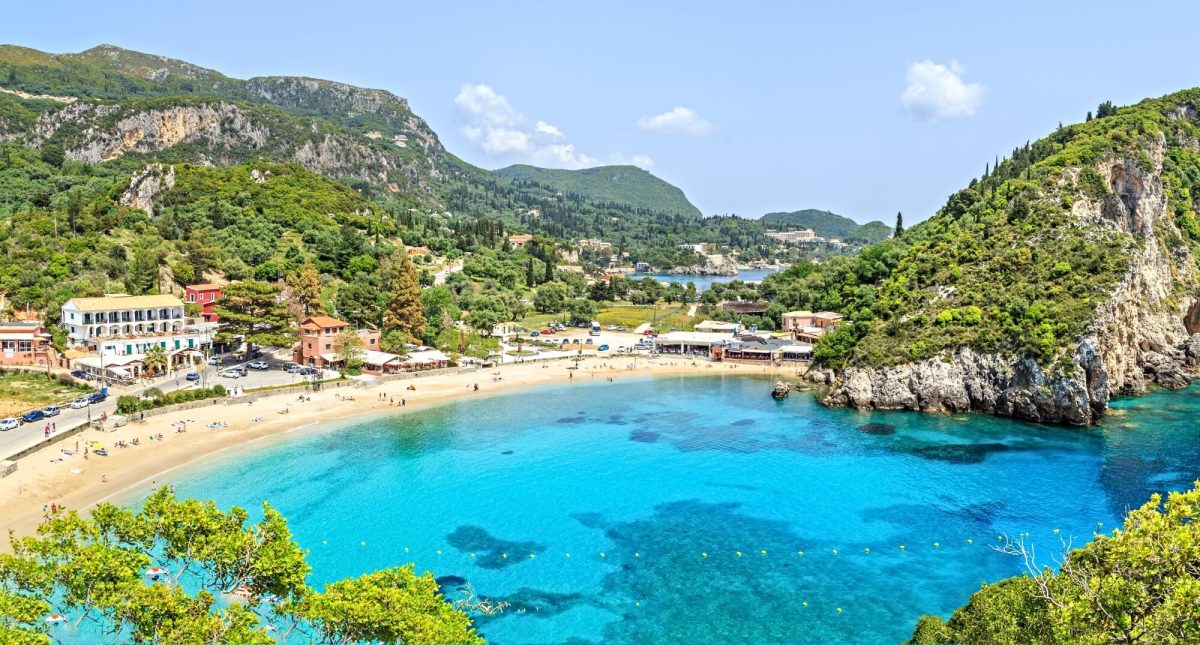
Known for its stunning beaches, Paleokastritsa is popular among expat retirees. The natural beauty of the area is unparalleled.
In the village itself, you will find several shops lining the beach road, mini markets, bakeries, bars, restaurants, and tavernas. However, limited entertainment options and potential off-season quietness might be drawbacks.
6. Acharavi
Located on the northern coast, Acharavi boasts a long sandy beach and all-year living opportunities.
Being a big village, it offers many services, including a bank, post office, hairdressers, florists, supermarkets, bakeries, and other shops. Additionally, you’ll find plenty of restaurants, cafes, and bars open year-round.
It’s family-friendly and has medical facilities, but expats might miss some cultural amenities.
7. Benitses
Located 7 miles to the south of Corfu Town, Benitses is another great location if you are looking for something very close to Corfu Town and don’t mind tourist crowds in summer.
It is small, just one main road lined with souvenir shops and a few good restaurants. Benitses beach is small but really nice.
The biggest downside is that the place becomes very crowded in summer.
8. Kassiopi
A lovely and quiet fishing village, Kassiopi is quite attractive for expat families. It is peaceful and safe and has a strong and friendly local community.
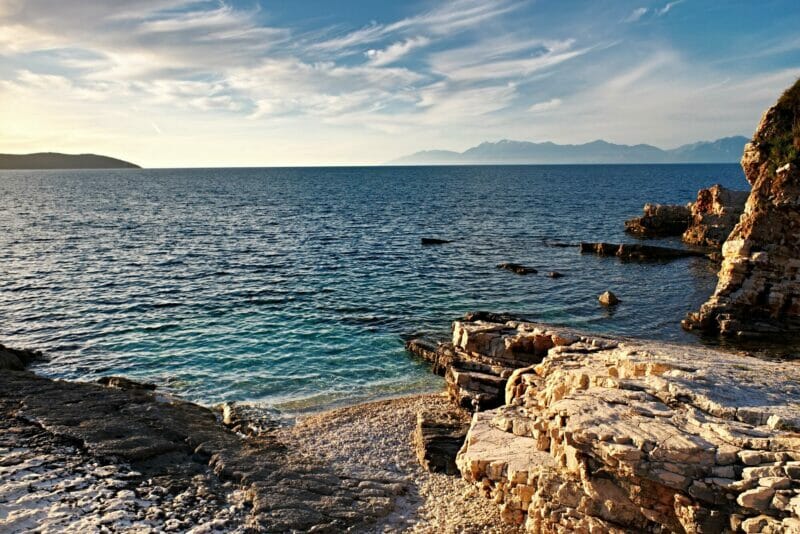
Kassiopi has little shops, cafes and taverns, banks, doctors, pharmacies, local schools, and supermarkets.
On the downside, it might feel a bit too remote and isolated, especially if you are used to city living.
9. Agios Gordios
Nestled on the west coast, Agios Gordios features a sandy beach and a relaxed vibe. It’s family-friendly, with stunning views.
It takes a half an hour’s drive to get to Corfu Town. A bus to Corfu Town stops in the center. Corfu International Airport is 8.1 mi away.
Agios Gordios has restaurants, shops, and amazing beaches to enjoy stunning sunsets and walks.
10. Barbati
Barbati offers a blend of tranquility and convenience. Situated approximately 20 kilometers northeast of Corfu Town, Barbati has easy access to Corfu Town.
Barbati has a range of amenities, including supermarkets, restaurants, and essential services. The best bit is the pristine Barbati Beach, just a short walk away, presenting a serene escape and recreational opportunities.
Real estate
In Corfu, the range of housing options caters to various budgets and lifestyle preferences, including:
- Apartments: These are a more affordable and practical choice, mostly located within towns, offering easy access to amenities and public transportation.
- Houses: A variety of traditional Greek houses and modern constructions are available in both urban and rural settings throughout Corfu. Village houses, especially older ones, can be particularly charming with their rustic appeal and more affordable.
- Luxury villas: For expats seeking an elite lifestyle, luxury villas are available with all modern desires, ranging from private pools to stunning sea views. Many are located near the coast, often boasting spectacular sunsets and panoramic views of the Ionian Sea.
Real estate prices start at around €1,500 per square meter for old village houses and occasionally surpass €5,000 per square meter for sea-close luxury villas.
Incentives for real estate investors: the non-dom tax regime
Greece’s government has introduced incentives to attract investments to the real estate market.
Under the Non-Dom Tax Regime, introduced in 2019, if you invest a minimum of €500,000 in real estate, business, or legal entities, you can shift your tax residency to Greece and pay an annual flat tax of €100,000, no matter how large your foreign income.
This is provided your foreign income comes from any of the 57 countries with whom Greece has tax treaties.
Besides, investing €500,000 means you can apply for a Greek Golden Visa and have your residency sorted (and, potentially, Greek citizenship, if you wish to.)
Find more information in our guide to the Greece Residency Options.
Travel options and connectivity
Corfu offers relatively good travel connections, with limited international travel available during the peak season and connecting flights in Athens available throughout the year.
Air travel
Ioannis Kapodistrias International Airport has regular flights to Athens, Preveza, and Thessaloniki all year round.
During the tourist season (approximately May to September), it provides regular flights to and from London, Amsterdam, Frankfurt, Dubai, and Tel Aviv.
The airport is located about 3 km away from Corfu Town, with regular bus routes connecting it to the town.
During wintertime, you will have to rely on connecting flights in Athens.
Ferries
Corfu is well-connected to several Greek mainland ports and neighboring islands. Ferries and hydrofoils operate regular routes to destinations like Igoumenitsa, Patras, and Paxi.
Ferries from Igoumenitsa depart several times a day, and the trip takes approximately 1.5 hours.
Ferries from and to Patras operate twice a week, and the travel time is around 7.5 hours.
You can take a ferry to and from Italy, the ports of Bari and Ancona. This is a great option if you want to bring your own car to the island.
Ferries to Paxi and the Diapontian Islands (Mathraki, Ereikoussa, Othoni) are also available.
Car rentals
For short journeys within the island, renting a car is a popular choice among expats, offering the freedom to explore the island’s scenic beauty at one’s own pace.
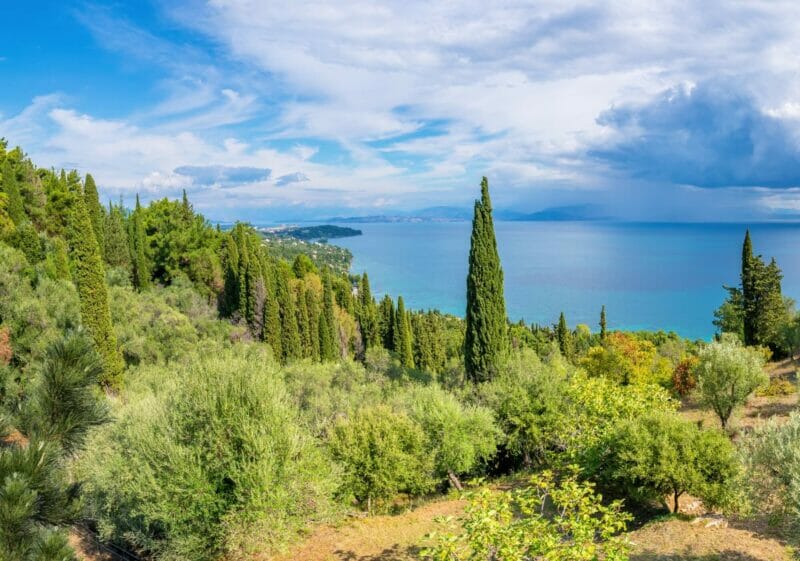
Budget at least €35 a day in the peak season in July and August.
Buses and taxis
Public transportation options are also available and include buses connecting various parts of the island and taxis for convenient point-to-point travel.
Public transport
The public transport system in Corfu is not what you call excellent.
Buses are the best option if you are on a budget or don’t want to drive.
Blue-colored city buses operate within towns, while green-colored intercity buses can take you to other areas of the island, including beaches, the airport, and the ports.
The central station of both bus types lies within Corfu Town.
Depending on your destination, a city journey can cost you either €1.10 or €1.80.
For longer journeys around the island, prepare to pay from €1.60 to €8.
You can also travel by bus from Corfu to Athens, Thessaloniki, or Larissa. To see the available routes and the detailed price list, visit the official timetable.
To buy a ticket, look for sales points near the bus stops (central bus station at San Rocco, vending machines, kiosks, etc.).
You can also get a day ticket for €5.
Internet and mobile connectivity
Corfu offers good internet and mobile connectivity. Most urban areas have access to 4G networks.
Free WiFi is available at the airport and in the town centers of main towns like Corfu Town. Many cafes, restaurants, hotels, and bars also offer free WiFi.
Internet
The island has seen notable improvements in its internet infrastructure over the years. With an average download speed of around 50 Mbps and an upload speed of approximately 10 Mbps, internet access is not bad unless you need to upload or download enormous amounts of data.
The main providers are WIND, Vodafone, and Cosmote.
Mobile
The leading mobile operators are, again, Cosmote, Vodafone, and WIND.
When you look at plans and prices on offer, there’s not much difference between the three provers.
Cosmote, however, is the largest and most popular provider because of its expansive coverage and dependable network, particularly in the more remote corners of Corfu.
Healthcare in Corfu
Corfu offers a reasonably well-developed healthcare system. While the island provides essential medical services, you might need to travel to mainland Greece for specialized treatment in certain cases.
Public and private healthcare
Generally, expats in Greece can access the publicly funded healthcare system ESY if they contribute to the Social Insurance Institute (IKA) and have a residence permit.
However, you need private health insurance to apply for a residence permit. Also, public health service has quite long waiting lists. So many expats prefer private health insurance to have quicker access to services.
Corfu is equipped with several public and private hospitals and clinics. Here are some of them:
- The General Hospital of Corfu (GHC) serves as the main public healthcare provider, offering a range of medical services to the population.
- Alexander Masoras Corfu General Clinic and Private Hospital provides immediate care for non-life-threatening illnesses.
- CorfuMedica, a 24-hour medical service, is a diagnostic, surgical, and therapeutic center in Corfu Town.
- Ionian Care is a multi-specialty and diagnostic center in the northern part of Corfu in Livadi Karousadon.
Medicines and prescriptions
You’ll find that you can buy many medicines in Corfu over the counter without prescriptions. Almost every village has a drugstore, and the staff commonly speaks English.
Health insurance
Unless you are coming on a work visa where your employer relocates you, you must buy comprehensive health insurance for your residency application.
You can do so by shopping locally or looking at your international health insurance options.
International health insurance can be quite expensive. To make sure you get the best value for money, compare international health insurance options from various providers to find the best deal.
Living in Corfu with a family
Corfu offers a family-friendly environment with various amenities tailored for families. Here’s what to expect if you are moving to Corfu with children
Leisure facilities
Corfu boasts over 200 beaches, providing ample opportunities for family outings and water activities. The island’s 30 playgrounds and parks offer recreational spaces for children to enjoy.
Moreover, families can explore cultural sites like the Achilleion Palace and the Corfu Museum of Asian Art for educational outings.
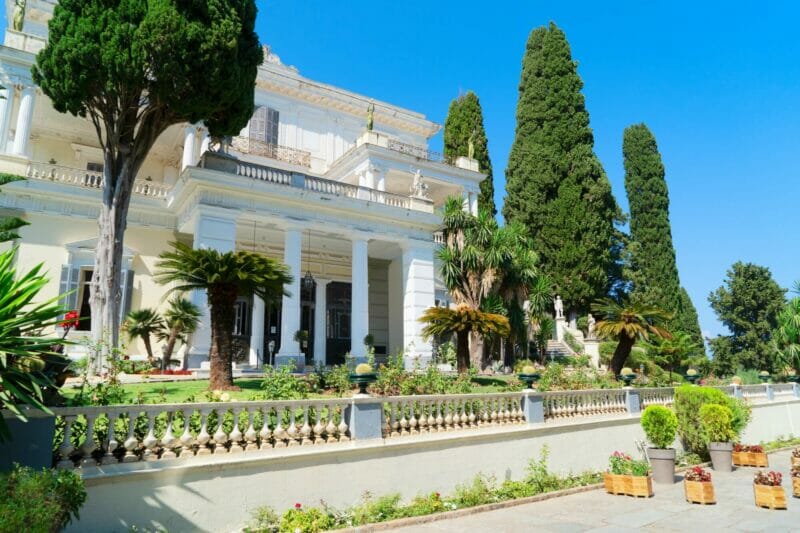
Schools
There are no international schools in Corfu, nor will you find private English schools. Homeschooling or online schooling is not permitted in Greece. Every child, by law, has to attend a school.
So your only option is local schools following the Greek curriculum.
Local schools predominantly teach in Greek and offer expatriate children a chance to integrate into the local community. Your children will be immersed in the Greek school system, and they will learn Greek like native speakers. They will also have a better all-round cultural understanding of how different cultures work.
Most local schools offer extra classes for foreign children who need help with the language.
Safety
Corfu maintains a relatively low crime rate, with its safety index scoring higher than the national average. Petty crime can occur, but violent incidents are rare. The island’s close-knit community and strong police presence contribute to a secure living environment.
Child-friendly environment
With its plethora of outdoor spaces and family-oriented attractions, Corfu is indeed child-friendly. In addition to playgrounds and parks, families can explore the Aqualand Water Park, a popular attraction for kids. Restaurants and cafes often welcome families and offer kid-friendly menus.
Retiring to Corfu
Corfu, the emerald isle of the Ionian Sea, might be the perfect destination for your golden years. As a retiree, consider these outstanding benefits that Corfu has to offer:
- Affordability: Corfu remains a relatively less expensive place to live than many European destinations. From groceries to housing, your money stretches further here.
- Special taxes for retirees: Greece has recently introduced a flat tax of 7% for foreign retirees, which means your pensions will not be heavily taxed.
- Favorable climate: A mild Mediterranean climate is one of Corfu’s major assets. Say goodbye to freezing winters and enjoy warm but not excessively hot summers.
- Healthy lifestyle: The Mediterranean diet, time-honored traditions, and slow pace of life contribute to Corfu’s healthy lifestyle.
- Outdoor activities: Whether you’re a fan of hiking, sailing, or simply strolling along the beach, Corfu offers an array of outdoor activities to keep you active.
For a potential retiree looking to settle in Corfu, it’s important to research of the healthcare services to ensure that your individual health needs can be duly met. So, while the siren call of Corfu might be enchanting, don’t pack those suitcases until you have a comprehensive plan in place.
Things to do in Corfu
Corfu offers a myriad of activities that families, friends, and couples of various ages can enjoy.
Beach exploration
With over 200 beaches, Corfu’s coastline invites sunbathing, swimming, and water sports. From family-friendly sandy shores like Agios Gordios to picturesque pebbled beaches like Barbati, there’s a beach for every preference.
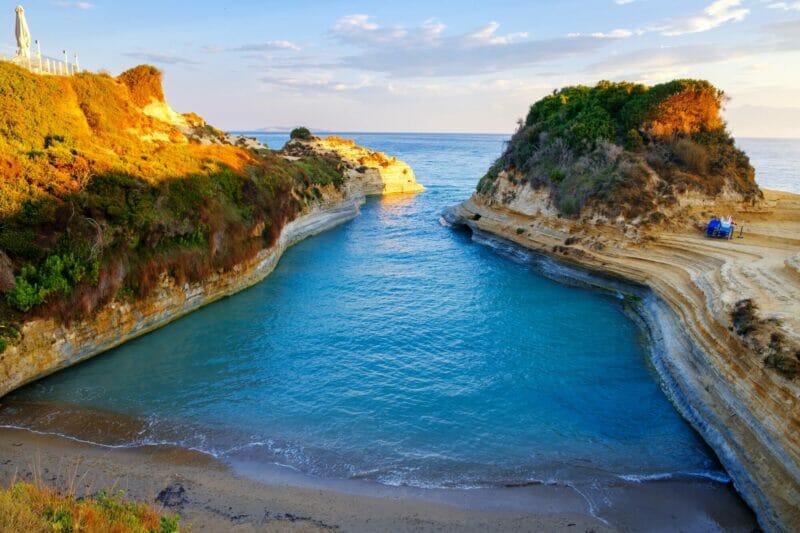
Here are the most popular beaches in Corfu:
Corfu, the emerald isle of Greece, is renowned for its stunning beaches. Here are some of the most popular ones:
| Beach Name | Coast | Beach Type | Amenities |
|---|---|---|---|
| Porto Timoni | West | Sandy | Restaurant, Bar |
| Agios Gordios | West | Sandy | Water Sports, Sunbeds, Umbrellas |
| Agios Georgios Pagon | North West | Sandy | Water Sports, Restaurant, Bar, Sunbeds, Umbrellas |
| Issos | South | Sandy | Water Sports, Restaurant, Bar |
| Kontogialos | West | Sandy | Water Sports, Restaurant, Bar, Sunbeds, Umbrellas |
| Arillas | North West | Sandy | Restaurant, Bar |
| Roda | North East | Sandy | Water Sports, Restaurant, Tavernas, Sunbeds, Umbrellas |
| Kassiopi | North East | Pebble | Restaurant, Bar |
| Dassia | East | Pebble | Water Sports, Tavernas, Sunbeds, Umbrellas |
| Barbati | East | Pebble | Water Sports, Restaurant, Bar, Sunbeds, Umbrellas |
Note: The amenities listed against each beach are subject to change and seasonality. Always check with local sources about current availability.
Water sports
Snorkeling, windsurfing, kayaking, and other water activities are available in Corfu. There are plenty of opportunities for aquatic adventures from Myrtiotissa to Halikounas. Dive in and enjoy the sea life.
Hiking and nature trails
Corfu invites hikers with its rich scenery. The 220-kilometer Corfu Trail highlights the island’s varied landscapes. Pantokrator Mountain provides especially stunning views for adventure seekers.
Cultural exploration
Embrace Corfu’s rich history by exploring its cultural landmarks. Visit the Achilleion Palace, once home to Empress Elisabeth of Austria, or the Old Fortress in Corfu Town, showcasing centuries of history.
Food and cuisine
Indulge in Corfu’s culinary offerings, influenced by Greek and Italian cuisines. Explore local markets, savor traditional dishes like pastitsada, and sample olive oil from the island’s olive groves.
Festivals and events
Festivals and events are a big part of Corfu’s local culture. Mark your calendars: the island comes alive with a variety of events throughout the year. A few of the standouts include:
- Easter Celebrations: Known far and wide, Easter in Corfu is an experience like no other. The whole island becomes a stage for processions, traditional music, and the famous ‘Pot Throwing’ ritual.
- Varkarola Festival: In August, the seafront at Paleokastritsa is transformed into a lively stage for this music and theatrical event, culminating in a dazzling fireworks display.
- Wine Festival: Keen on tasting some excellent local wines? You will enjoy the September Wine Festival; it’s a sensory delight you can’t afford to miss!
- Saint Spyridon Feast Day: On 12th December, Corfu honors its patron saint, St. Spyridon. Church services, processions, and plenty of feasting make this a memorable occasion.
These are just a few highlights. Check out local listings when you arrive, as there are always local events and festivities around the island.
Day trips
Venture beyond the island with day trips to Paxos and Antipaxos for secluded beaches or to mainland destinations like Parga and Ioannina for cultural exploration.
Outdoor sports
Corfu is a playground for outdoor sports enthusiasts. Whether you’re after a leisurely game of golf or a blood-pumping rock climb, you’ll find facilities to cater to your interests.
Golf
The Corfu Golf Club, nestled in the Ropa Valley, offers a championship course that hosts international tournaments throughout the year. The scenic landscape makes it a delight for the sport and the panoramic vistas.
Tennis
Tennis is available in most resorts, with notable facilities in Corfu Town. The Tennis Club Corfu, for instance, features clay courts and offers both casual play and competitions.
Cycling
With its diverse topography, Corfu is a haven for cyclists. Rent a bike and explore at your own pace, or join a local cycling club and hit the trails. For cycling routes, have a look at the bikemap.net.
Other activities
Other available activities include rock climbing, trekking tours, paragliding and paramotor flights, caving, horse riding tours, etc.
Socializing and making friends
Corfu has a sizable expat community. Almost every village has regular gatherings and activities where expats socialize, often working together for a cause.
Below are some of the expat clubs and groups in Corfu that you can join:
- Corfu Expats Facebook Group: An online space where you can seek advice, exchange ideas, or simply connect with other expats living on the island. Expats Corfu, Corfu Forum, Corfu Town, and The Corfu Grapevine are the most prominent groups.
- The Anglo-Hellenic League Corfu Branch: A group that seeks to enhance the understanding and appreciation of Greek culture among expats.
- Corfu Home Owners Association: A registered group for individuals with a home in Corfu that aims to represent its members and act in their collective interest.
Joining these groups could go a long way in easing your assimilation into Corfu’s expat community.
Things to know before you move
Living in Corfu does come with its own unique set of challenges. Getting familiar with them ahead of your move can help you circumvent potential bumps along the way and prepare to accept unavoidable downsides.
Practicalities of island living
Corfu is an island, so some things might be a bit trickier and expensive, especially if you can’t find them locally.
This is true for shopping, eating out, and entertainment.
Although it is a pretty well-equipped island, you won’t find the same range of entertainment opportunities as a big city like Athens can offer.
While you’ll find a few big supermarkets on the island, remember that prices for imported stuff could be slightly higher because of the transportation costs.
Be mindful of the tourist season
Since Corfu relies heavily on tourism, you might find certain areas pretty crowded, especially during the busy tourist season.
Being a bigger island, Corfu is still pretty much open in winter. However, it becomes much quieter. Direct charter and budget flights stop operating. So if you need to travel, you will have to change planes in Athens.
Winter weather in Corfu
It’s not warm, dry, and sunny all year round in Corfu. And you cannot bathe in the sea all year round unless you are a cold swimming enthusiast. From January to April, the water temperature doesn’t exceed 16°C/61°F.
Winter in Corfu is quite a distinct season with frequent storms, flashes of lightning, and heavy rain. December is the wettest month.
January is the coldest. At night time, the temperature may drop to -1°C/30°F.
Internet connection is not perfect
Although the internet has improved over the past few years, and you will find it ok in urban areas, if you go anywhere more rural, you need to check beforehand whether you can access the speed you need.
Mosquitoes
Summer months come with mosquitoes that become quite active at night, so various repellents and antihistamines are necessary.
Learn Greek
Although so many locals speak English in Corfu and there are expats everywhere, learning basic Greek will earn you respect from the local community and make daily interactions in the shops, offices, and markets more effective and pleasant.
Final thoughts about living in Corfu
Living in Corfu extends beyond its beautiful landscape. Despite its pleasant weather, stunning views, and rich history, Corfu’s true charm lies in its unique, enduring qualities that make living here an extraordinary experience.
Remember, the expat experience is what you make of it. Engage with the local culture, tradition, and people. Be open to new experiences, and before you know it, you’ll find Corfu becoming a part of who you are. Here’s to your new adventure in this little slice of paradise – ευχόμαστε καλή τύχη (we wish you good luck)!
You might find useful:
Helpful external links:
- Digital public services for Greece residents
- The 6th Health Regional Authority, which is responsible for the health facilities in Corfu
- British Vice Consulate Corfu